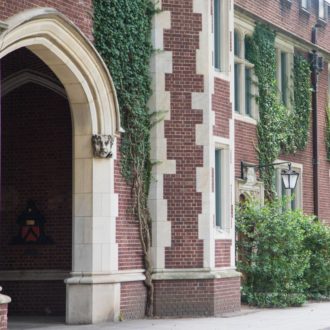
My friends and fellow students, springtime has sprung forth from the recently-frozen New Jersey soil. Spring Break is in the rear-view mirror, and we march toward Dean’s Date, finals, and summer at a steady clip. But another set of deadlines draws even nearer, deadlines whose immediacy can be seen on the tired faces of many upper-class students. Yes, friends, I’m talking about independent work, JPs and theses, the academic tulips of the Princeton spring semester.
I myself have kept relatively quiet about my JP in these webpages—until today! In this post, I shall share—in the spirit of that other springtime institution, March Madness—a “halftime report” on the JP process, consisting in various pieces of advice and reflection geared toward current and future writers of long papers, theses, and so forth.
Friends, the first piece of advice regarding independent work, or really any other large/intimidating/daunting project, is to (attempt to) take a page from President Roosevelt and free yourself from fear. This is, of course, a highly personal project, requiring reflection on what you dread about your impending assignment. Do you not know where to begin? Are you unsure about what you have to say? Honestly facing questions such as these is one way to get in touch with your (very legitimate) anxieties about a major project.
Here’s a personal example. My JP is an analysis of a book-length work of social criticism. In earlier stages of the project, one worry I had was actually understanding the details of that book. (It’d be pretty embarrassing to miss something in the source material that ended up contradicting my argument!) However, once I realized I was worried about that kind of error, I was able to counteract that by approaching the book more systematically, using some of the principles I laid out in a previous post on working with books.
The general insight of my anecdote, then, is this: after some initial reflection, you’ll hopefully gain a better understanding of what’s getting you down about your project. Then you can begin to work around any inner obstacles you face. Again, this probably looks different from person to person. However, the most common advice I’ve heard about how to put this into practice is to, quite simply, start writing. For me, getting ideas out of my head and on to paper often helps me begin to organize my thoughts and to conceptualize my project in a more analytical way.
With some thinking and writing about your project under your belt, you then want to speak with your adviser. Looking back on my independent work journey thus far, I consider the first meeting with my adviser a major milestone as it helped me to think more clearly about both the strengths and weaknesses of my paper. This reduced the unnerving uncertainty I had about my project, stifling nagging questions like “Am I even on the right track here?”
Having touched on three major elements of the writing process (reflection, actually starting to write, and speaking with your adviser), I now have a couple pieces of miscellaneous advice to share about working on independent work. The first is to set aside dedicated chunks of time to work on your project; I chose Friday afternoons because by that time I’ve completed class for the week, freeing me to focus on my JP. My second suggestion is to work alongside friends/classmates/fellow writers of independent work papers. The main reason: you’ll be less likely to quit. Sure, you might occasionally distract one another with gripes about the grind, but in my experience, such commiseration is actually quite helpful. And critically, when your friends are writing with you around a table, you’ll find it much harder to close your laptop and walk away from the task at hand. Simply put, friends help friends finish papers by motivating them (maybe even peer-pressuring them, in a good way!) to push through the sometimes-vexing process of writing.
For now, friends, this is all. I hope that somewhere in my semi-autobiographical musing you managed to find a tidbit of useful insight, something that will lighten your load as we round out the academic year. Next time you hear from me, I’ll likely be post-JP… But until then, happy writing!
—Shanon FitzGerald, Social Sciences Correspondent

